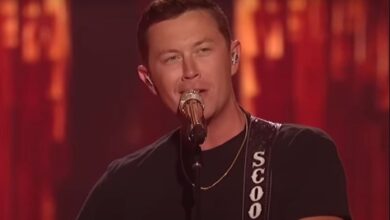Garth Brooks and Justin Timberlake Perform “Friends In Low Places”
On December 19, 2014, at Nashville’s Bridgestone Arena, Justin Timberlake and Garth Brooks delivered a remarkable collaboration that blended their respective musical worlds in a moment of pure magic. Timberlake, known primarily for his pop and R&B prowess, surprised and delighted fans with a touch of country nostalgia alongside the legendary Garth Brooks, marking a standout moment during Timberlake’s 20/20 Experience World Tour.
The genesis of this memorable duet was as serendipitous as it was spontaneous. Brooks, a towering figure in country music who had recently returned to the stage after a lengthy hiatus, attended one of Timberlake’s concerts and caught the attention of the pop icon himself. Timberlake, with his deep-seated roots in Tennessee and an early career nod to country music on “Star Search,” extended an invitation to Brooks to join him on stage in Nashville. The crowd erupted in approval as Timberlake introduced Brooks during a rendition of the timeless hit “Friends In Low Places.”
Timberlake’s genuine enthusiasm for the moment was infectious, visibly thrilled to share the stage with one of his musical idols. His childhood roots in country music added a layer of authenticity to the performance, resonating deeply with fans who witnessed his genuine joy at performing alongside Brooks. As Brooks stepped onto the stage, his presence and commanding voice filled the arena, instantly drawing the audience into a shared celebration of music.
“Friends In Low Places,” a classic country anthem known for its sing-along appeal and poignant lyrics, took on new life with Timberlake and Brooks’ collaboration. The crowd, which had predominantly gathered for a pop concert, embraced the song with fervor, singing along to every word. This unexpected blend of pop and country not only showcased Timberlake’s versatility but also underscored Brooks’ enduring influence and timeless appeal in the music industry.
For Brooks, whose return to touring marked a triumphant comeback, the duet with Timberlake represented a moment of passing the torch to a new generation of artists while reaffirming his own place as a legend in country music history. His dynamic presence and heartfelt delivery during the performance exemplified why he remains a beloved figure among fans of all ages.
Beyond the musical prowess displayed on stage, the collaboration between Timberlake and Brooks symbolized the unifying power of music. It bridged genres and generations, bringing together fans who may have never imagined witnessing such a unique pairing. Timberlake’s respect for Brooks as an entertainer and Brooks’ admiration for Timberlake’s artistry created a mutual admiration that resonated throughout the arena.
The night in Nashville became an indelible chapter in both Timberlake and Brooks’ careers, resonating far beyond the confines of the Bridgestone Arena. It reaffirmed Timberlake’s connection to his Tennessee roots and Brooks’ ability to captivate audiences with his timeless hits. This unexpected duet not only delighted those in attendance but also sparked conversations about the intersection of pop and country music and the enduring impact of both artists on the industry.
Since that memorable night, Timberlake and Brooks have continued to chart their own paths in music. Timberlake’s career has seen further experimentation with different musical styles, while Brooks has maintained his status as one of country music’s most revered icons. Their collaboration at the Bridgestone Arena stands as a testament to the transcendent nature of great music, proving that when artists come together across genres, they can create moments that resonate for years to come.
In retrospect, the duet between Timberlake and Brooks was more than just a performance; it was a celebration of shared musical heritage and a reminder of the universal joy that music can bring. It remains a cherished memory for fans who were fortunate enough to witness two musical giants come together in harmony, leaving an enduring legacy in the annals of music history.





